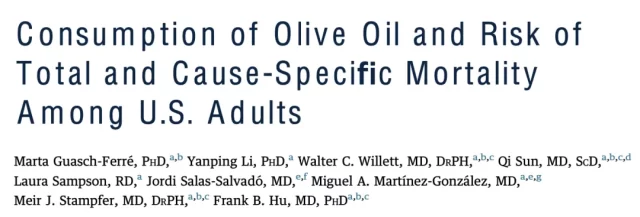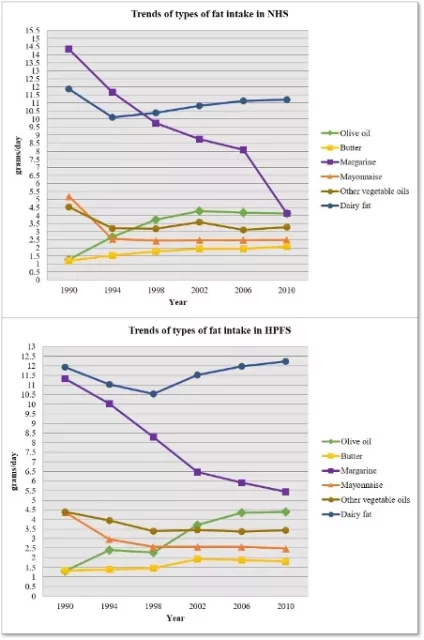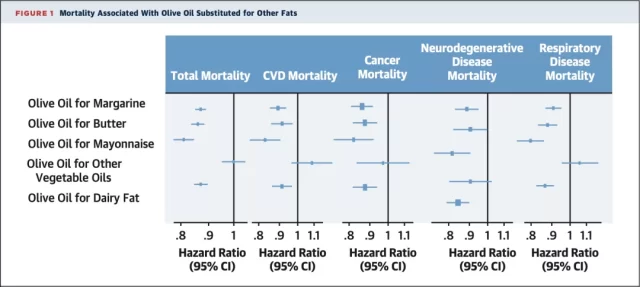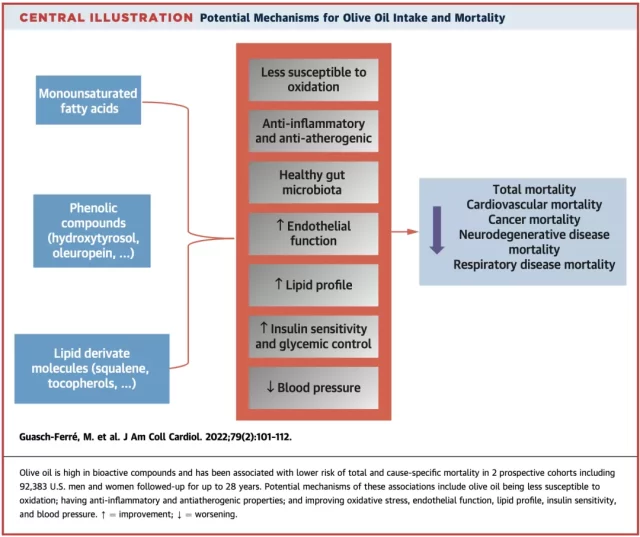Daily olive oil intake of more than 7 grams can reduce risks of some diseases
- Aspirin: Study Finds Greater Benefits for These Colorectal Cancer Patients
- Cancer Can Occur Without Genetic Mutations?
- Statins Lower Blood Lipids: How Long is a Course?
- Warning: Smartwatch Blood Sugar Measurement Deemed Dangerous
- Mifepristone: A Safe and Effective Abortion Option Amidst Controversy
- Asbestos Detected in Buildings Damaged in Ukraine: Analyzed by Japanese Company
Daily olive oil intake of more than 7 grams can reduce risks of some diseases
- Red Yeast Rice Scare Grips Japan: Over 114 Hospitalized and 5 Deaths
- Long COVID Brain Fog: Blood-Brain Barrier Damage and Persistent Inflammation
- FDA has mandated a top-level black box warning for all marketed CAR-T therapies
- Can people with high blood pressure eat peanuts?
- What is the difference between dopamine and dobutamine?
- How long can the patient live after heart stent surgery?
Daily olive oil intake of more than 7 grams can reduce risks of some diseases
JACC: Harvard scientists found that daily olive oil intake of more than 7 grams was associated with a 19% reduction in the risk of all-cause mortality and a 29% reduction in the risk of death from neurodegenerative diseases
Have you ever paid attention to what kind of oil is used for cooking at home, whether it is vegetable oil (soybean oil, peanut oil, olive oil, etc.) or animal oil (lard, butter, animal butter, etc.) ?
Singularity Cake was given olive oil by a friend who is very concerned about health care, saying that it has higher nutritional value than other oils and is more beneficial to health, so I searched the Internet and found that olive oil is more expensive than other commonly used vegetable oils. Times more than that.
Singularity Cake can’t help but wonder how olive oil affects health and whether it’s worth buying.
It happened that Professor Hu Bingchang of Harvard School of Public Health and his team recently published an article on olive oil and the risk of death in the Journal of the American College of Cardiology (JACC), which may answer this question to a certain extent [1].
Professor Hu’s team found that people who ate more than 0.5 tablespoons (7 grams) of olive oil per day had a lower risk of all-cause mortality compared with people who ate olive oil never or very rarely (on average, less than 1 time per month). % .
Among them, the risk of death from cardiovascular disease was reduced by 19%, the risk of death from cancer was reduced by 17%, the risk of death from neurodegenerative diseases was reduced by 29%, and the risk of death from respiratory diseases was reduced by 18% .
In addition, the researchers found that replacing the same amount of margarine, butter, mayonnaise or dairy oil with 10 grams of olive oil per day reduced the risk of all-cause and cause-specific death by 8%-34% , but replacing other vegetable oils with olive oil did not significantly change the risk of death.
In this way, in terms of death risk, olive oil is similar to the commonly used soybean oil, corn oil, and rapeseed oil.

Let’s take a closer look at how this research was carried out.
This study is based on 2 prospective cohorts in the United States that are still being followed – the Nurses’ Health Study and the Health Professionals Follow-up Study. The nurse cohort was established in 1976 and included 121,701 female nurses aged 30-55, and the physician cohort was established in 1986 and included 51,525 male doctors aged 40-75.
After that, the researchers mailed a questionnaire to the doctors and nurses every 2 years about their lifestyle and health status, and every 4 years about their diet over the past year.
The olive oil study took 1990 as the baseline and included people with no history of cardiovascular disease or cancer . A total of 60,583 women and 31,801 men were finally included in the analysis after excluding those with missing data on olive oil intake and abnormal energy intake during baseline or follow-up (1994, 1998, 2002, 2006, 2010) .
Estimates of study exposures—olive oil, other vegetable oils (soybean, corn, safflower, canola) , margarine, and butter intake were based on the following questions on a food frequency questionnaire:
- Frequency and type of salad dressing (skim, low-fat, olive oil, regular)
- How often olive oil, margarine, and butter are added to bread or other foods
- Frequency and type of cooking oil (olive oil, margarine, butter, vegetable oil, vegetable shortening, lard) and brand of frying, frying, and baking foods at home
- Types of margarine and butter (sticks, tubs, soft)
Intakes of dairy oils and other oils and fats were calculated based on the frequency of consumption of the corresponding food and the USDA Food Composition Table.
Confirmation of death, the study outcome, relied on federal or state death records or reports from relatives and postal services. Cause of death information comes from medical records, autopsy reports or death certificates.
To facilitate presentation of results, researchers divided olive oil intake into 4 categories— never or <1 time/month (control group), >0~≤4.5 g/day (>0~≤1 teaspoon), > 4.5~≤7 g/day (>1 tsp~≤0.5 tbsp) and >7 g/day (>0.5 tbsp), assigning causes of death to 5 categories – cardiovascular disease, cancer, neurodegenerative disease, respiratory disease and others .
In 1990-2010, the olive oil intake of the study subjects increased from 1.6 g to 4 g per day, but it was still significantly lower than the intake level of the population in the Mediterranean countries such as Spain (40 g per day); in contrast, margarine The intake was reduced from 12 grams per day to 4 grams; other fat intakes remained largely unchanged.

▲ The trend of olive oil intake over time
As of 2018, a total of 36,856 deaths had occurred during a 28-year follow-up. After adjusting for age, gender, ethnicity, body mass index, multiple personal medical histories, family medical history, healthy eating scores, physical activity, smoking, alcohol consumption, and other factors, the researchers found that olive oil intake was associated with both all-cause and cause-specific deaths. (cause-specific mortality) was negatively correlated .
Specifically, each additional 5 grams of olive oil ingested was associated with a 3%-8% lower risk of death ; those who consumed more than 0.5 tablespoons of olive oil per day ( 7 g) were associated with a 19% lower risk of death from all-cause and cardiovascular disease, and a 17%, 29%, 18%, and 13% lower risk of death from cancer, neurodegenerative disease, respiratory disease, and other causes, respectively .
In order to verify the stability of the results, the researchers conducted a number of sensitivity analyses, such as further adjusting the income, education level and other factors of the research subjects, switching to a competing risk model, and changing the calculation method of olive oil intake. These analysis results are consistent with the above results.
In addition, the researchers found that replacing the same amount of artificial cream, butter, mayonnaise or dairy oil with 10 grams of olive oil per day was associated with a 13%, 14%, 19% and 13% lower risk of all-cause mortality, respectively . Similar conclusions were reached when stratified by etiology—this alternative was associated with a significantly lower risk of death from cardiovascular disease, cancer, neurodegenerative disease, and respiratory disease. But substituting olive oil for other vegetable oils did not significantly change the risk of death .

▲ How the risk of death changes after replacing other cooking oils with olive oil
These findings are consistent with recommendations from the Dietary Guidelines, both of which recommend that we switch from animal oils to vegetable oils.
So what’s so good about olive oil?
The researchers suggest that olive oil may be associated with a reduced risk of death from disease because it is rich in monounsaturated fatty acids , phenolic compounds (eg, hydroxytyrosol, oleuropein) and lipid derivatives (squalene, fertility phenol) , these substances have antioxidant, anti-inflammatory, anti-atherosclerotic properties, and are also related to the beneficial flora in the gut, which can improve vascular endothelial function, improve insulin sensitivity, and help control blood sugar and lower blood pressure [2] -7].

▲ Potential mechanism by which olive oil reduces the risk of death
Although this study is quite comprehensive in its investigation of olive oil and mortality risk, there are inevitably some limitations, such as the inability to determine a causal association, the possibility of residual confounding, and the fact that only doctors and nurses were the subjects of the study, which may limit the conclusions of the study. However, estimates of olive oil intake using food frequency questionnaires may be biased.
In conclusion, this study tells us that increased olive oil intake is associated with a lower risk of death and that replacing animal oils with vegetable oils rich in unsaturated fatty acids is more beneficial to health . Although animal oil is fragrant, don’t be greedy~
references
[1] Guasch-Ferré M, Li Y, Willett WC, et al. Consumption of Olive Oil and Risk of Total and Cause-Specific Mortality Among US Adults. J Am Coll Cardiol. 2022;79(2):101-112. doi:10.1016/j.jacc.2021.10.041
[2] López-Miranda J, Pérez-Jiménez F, Ros E, et al. Olive oil and health: summary of the II international conference on olive oil and health consensus report, Jaén and Córdoba (Spain) 2008. Nutr Metab Cardiovasc Dis . 2010;20(4):284-294. doi:10.1016/j.numecd.2009.12.007
[3] Covas MI, de la Torre K, Farré-Albaladejo M, et al. Postprandial LDL phenolic content and LDL oxidation are modulated by olive oil phenolic compounds in humans. Free Radic Biol Med. 2006;40(4):608- 616. doi:10.1016/j.freeradbiomed.2005.09.027
[4] Bulló M, Lamuela-Raventós R, Salas-Salvadó J. Mediterranean diet and oxidation: nuts and olive oil as important sources of fat and antioxidants. Curr Top Med Chem. 2011;11(14):1797-1810. doi :10.2174/156802611796235062
[5] Fitó M, Guxens M, Corella D, et al. Effect of a traditional Mediterranean diet on lipoprotein oxidation: a randomized controlled trial. Arch Intern Med. 2007;167(11):1195-1203. doi:10.1001/archinte .167.11.1195
[6] Ruiz-Canela M, Martínez-González MA. Olive oil in the primary prevention of cardiovascular disease. Maturitas. 2011;68(3):245-250. doi:10.1016/j.maturitas.2010.12.002
[7] Ros E, Martínez-González MA, Estruch R, et al. Mediterranean diet and cardiovascular health: Teachings of the PREDIMED study. Adv Nutr. 2014;5(3):330S-6S. Published 2014 May 14. doi: 10.3945/an.113.005389
Daily olive oil intake of more than 7 grams can reduce risks of some diseases
(source:internet, reference only)
Disclaimer of medicaltrend.org
Important Note: The information provided is for informational purposes only and should not be considered as medical advice.



